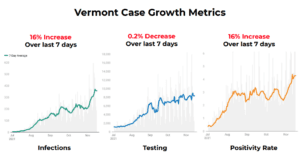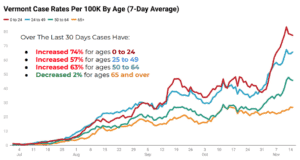By Ethan Weinstein
Following a week of record cases, Gov. Phil Scott will call the Legislature back for a special session, allowing them to pass a law granting municipalities to install local mask mandates — but only on his terms.

With case counts increasing but testing remaining fairly stagnant, the virus is certainly more prevalent throughout Vermont.
Scott called his decision an “olive branch” and a “compromise.” Vermont currently has the fifth highest Covid infection rate in the country and has been facing increased pressure to act reinstate mask mandates.
Noting the characteristics he deemed acceptable, Scott will require that the law allow towns to pass mask mandates only until April 30, and towns will have to renew their mandates every 30 days.
“I will veto anything else,” Scott said.
While Scott and his staff continue preaching a message that case counts don’t matter, Commissioner of Health Dr. Mark Levine said that 10-30% of people infected with Covid develop long Covid. Levine added that he expects long Covid will be “the next pandemic,” seemingly contradicting the Scott administration’s claims that case counts are not an important statistic.
But, despite mentioning the pandemic of the future, Levine opened with the present: “The pandemic isn’t over,” he said, even though many might feel “simply done” with dealing with life under Covid.
Both case count and test positivity rate were up 16% week over week, and the state’s modeling continues to show no path toward decreasing cases in the near future.
Addressing the progress of the newest vaccine-eligible age group, Secretary Mike Smith said, 15,991 Vermont children 5-11, or 36%, have received or are currently signed up for their first vaccine dose.
To keep kids learning in person, schools in 35 supervisory unions have enrolled in the state’s test-to-stay program, employing rapid antigen tests. Last week, schools used 2,600 antigen tests as part of the test-to-stay program.
Education Secretary Dan French, like the rest of the Scott administration, stressed the need for vaccines, particularly in schools. “I expect ultimately that we will see incremental school closures among schools with relatively low student vaccination rates as a result of staffing issues,” he said.
Due to high case counts, the state is asking citizens to contact trace for themselves. The Vermont Dept. of Health Nov. 13 tweeted that “due to the large number of Covid-19 cases” across the state, it’s prioritizing contact tracing people “at higher risk.” Vermonters who test positive for Covid were asked to “isolate at home away from other people and begin reaching out to close contacts immediately.”

The stagnation of cases among those 65 and over suggests booster shots are helping slow the spread of Covid, Dr. Levine said.
Asked why he feels the need to defer the responsibility of mandates to municipalities rather than take the lead himself, Scott said that towns “know their residents better than I do.”
Still, the governor made clear that he does not support mask mandates. “You have to reflect on what mandates represent,” he said, not specifying further.
Again, the governor appeared to contradict himself and his outspoken support for his health commissioner, Dr. Levine. Levine and Scott have in months past repeatedly dismissed the need for a mask mandate.
Today, as the state anticipates coming mandates, Levine seemed to switch his stance. Mask mandates, even municipal mandates rather than state mandates, appear to reduce spread, he said, citing “the literature.”
But, Levine specified, most of the data on the efficacy of mask mandates draws on pre-Delta variations of Covid. Less is known about the efficacy of patchwork, town-based mask mandates in the age of Delta.
On the minds of many was Sen. Patrick Leahy’s announcement Monday that he will not seek reelection. Asked if he will run for the open seat, Scott once again reiterated that he would not.
Rutland, Windsor Counties
Rutland County reported 48 new cases on Tuesday, bringing the 14-day case total to 708. Meanwhile, Windsor County reported 9 new cases on Nov. 16, with 338 cases in the last 14 days. The statewide, seven-day rolling case average is 357 as of Tuesday.
Rutland has now entered the highest category of case spread, defined as more than 80 cases per 10,000 people in the past two weeks, Health Dept. data shows. Bennington and Springfield are also in the highest category. Other communities in that category include St. Albans, St. Johnsbury and Barre.




